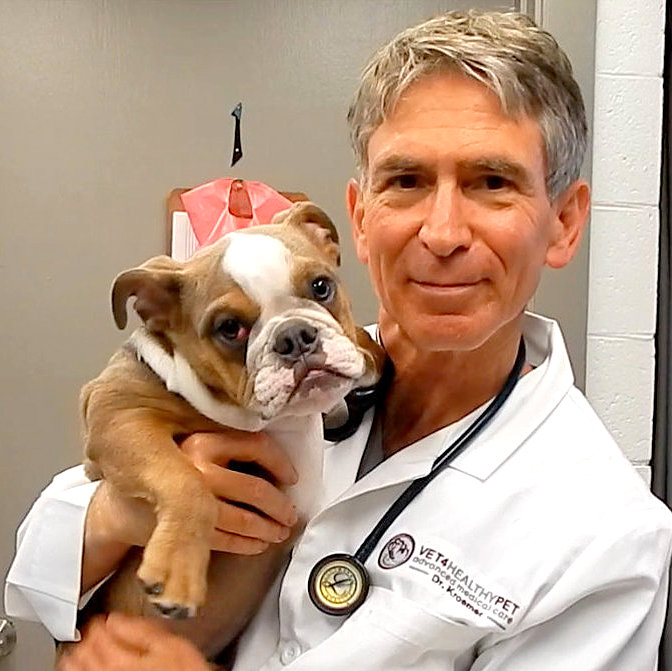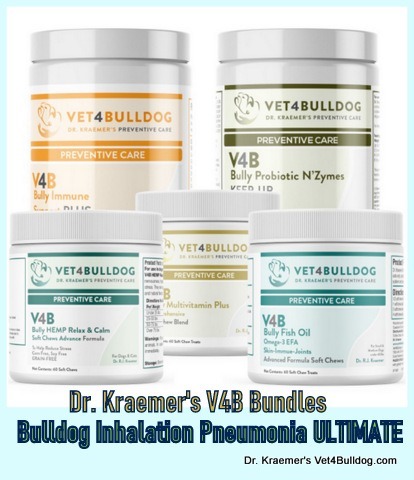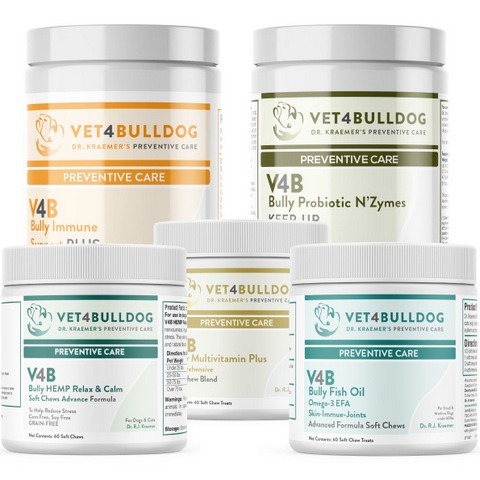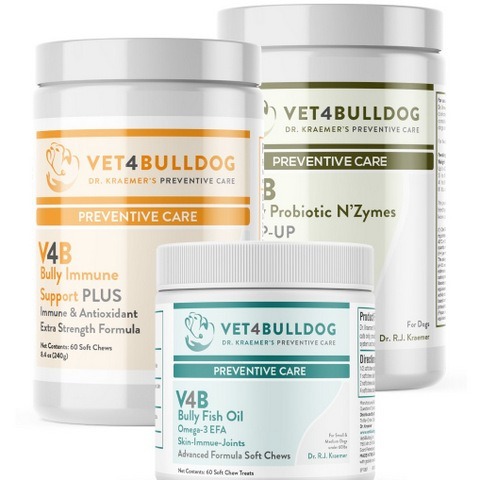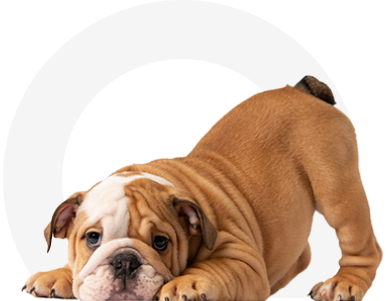Aspiration pneumonia in bulldogs and French bulldogs, along with other brachycephalic breeds, is, unfortunately, more prone to aspiration pneumonia than other dog breeds and usually occurs when they inhale foreign substances, including:
- Vomit
- Regurgitated food
- Gastric acid reflux
This condition causes lung damage due to the immediate inflammatory response to the inhaled foreign material. Additionally, the situation can worsen due to infection from bacteria found in the aspirated content.
The acute inflamation and infection is life-threatening
Bulldog Aspiration Pneumonia 5 X MUST KNOW
- The most common cause of bulldog aspiration pneumonia is BOAS
- Therefore, early repair of bulldog stentoic nares and an elongated palate is critical.
- Inhalation of vomit regurgitated food, and gastric acid cause inflammation and infection of the lungs
- Treatment includes oxygen, rest, antiemetics, anti-reflux, and antibiotics
- Prevention includes Dr. Kraemer’s Aspiration Pneumonia Bundles
Welcome to Our “Prevention Over RX” Bulldog Community
Aspiration Pneumonia in Bulldogs and French Bulldogs / SYMPTOMS:
- Breathing difficulties
- Swallowing difficulties
- Coughing, fever
- Discharge from the nasal passages
- Rapid breathing
- Bluish-purplish tongue (cyanosis)
- General weakness and intolerance to exercise due to oxygen deprivation.
- Loss of energy and reduced appetite
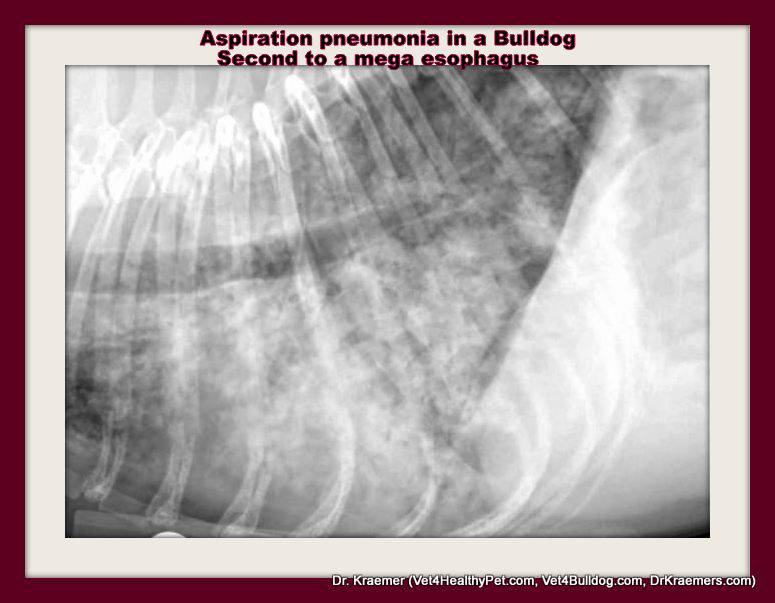
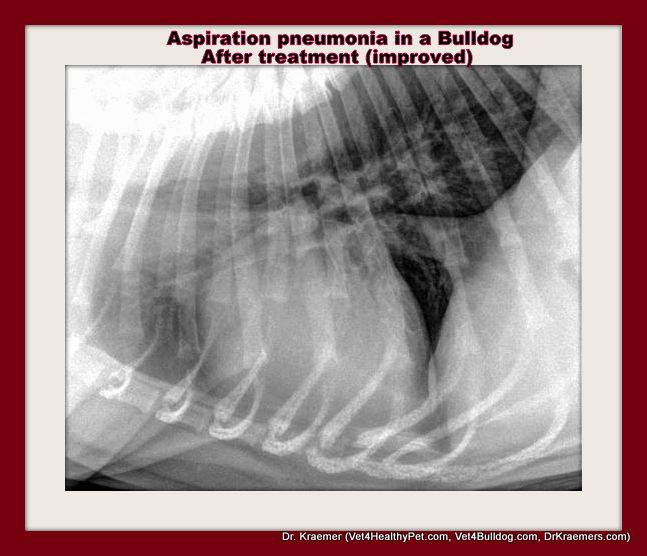
Aspiration Pneumonia in Bulldogs and French Bulldogs CAUSE
The leading cause of bulldog aspiration pneumonia is untreated bulldog brachycephalic syndrome (BCS)
BOAS AND BULLDOG PNEUMONIA
There’s a strong connection between BOAS (Brachycephalic Obstructive Airway Syndrome) and aspiration pneumonia.
BOAS conditions include:
- Stenotic nares
- Elongated soft palate
- Evertated Laryngeal Saccules
- Hypoplastic Trachea
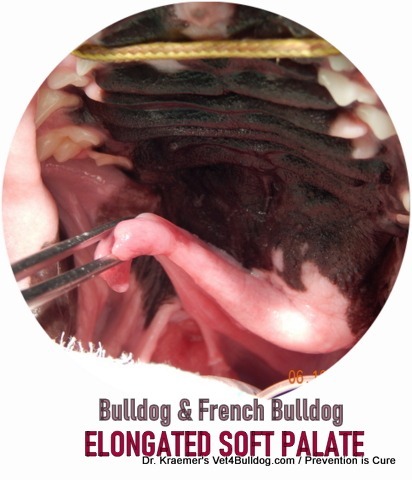
The effort to breathe against these obstructions can cause negative pressure in the airways, potentially drawing stomach contents into the esophagus and throat, where they can be aspirated into the lungs.
High Vagal Tone, Vasovagal Reflex, and BOAS:
Among others, the vagus nerve plays a crucial role in controlling heart rate, gastrointestinal activity, and certain reflex actions such as coughing and sneezing. In the context of BOAS, struggling for breath can be stressful and physically demanding, potentially triggering a vasovagal response. This response can lead to sudden relaxation of the lower esophageal sphincter, allowing gastric contents to reflux into the esophagus and potentially be aspirated into the lungs.
- gastric reflux: stomach acid flowing back up into the esophagus.
- Retching: the forceful attempt to vomit without expelling anything.
- Vomiting: forcing stomach contents out of the mouth.
Gastric reflux, retching, and vomiting are caused by a high vagal tone (vasovagal reflux) assoicated with BOAS.
BULLDOG ASPIRATION PNEUMONIA / MEGAESOPHAGUS:
Megaesophagus is an enlargement of the lower aspect of your bulldog esophagus due to injury to its mucosal lining from the above BOAS-induced acidic gastric reflux.

BULLDOG ASPIRATION PNEUMONIA / OTHER:
Less common are oral, laryngeal, and pharyngeal problems, such as
- GERD
- Hiatal Hernia
- Hypoplastic trachea
- Laryngeal nerve paralysis: (BOAS)
- Laryngeal collapse: (BOAS)
- Myasthenia gravis: neurological disease
- Oropharyngeal and Laryngeal Tumors

Aspiration Pneumonia in Bulldogs / DIAGNOSIS:
- EXAM: Physical exam
- IMAGING: Chest Radiographs, endoscopy
- BLOOD TEST: A complete blood profile
- CULTURE & CYTOLOGY: Bacterial culture and cell cytology, via bronchoalveolar lavage, trans tracheal wash, or endoscopy
Warning: Tests that require sedation or anesthesia, like radiographs, endoscopy, BAL, or TTW (a wash or lavage), should be modified or placed on hold until the patient’s status is improved.
Aspiration Pneumonia in Bulldogs / PREVENTIVE CARE
Given that BOAS is the most common cause of inhalation pneumonia in bulldogs, it’s essential to address this issue as soon as possible, whether it involves widening a pinched nose or trimming an elongated palate. Similarly, GERD due to a hiatal hernia can be managed by repairing the hernia, and managing ongoing megaesophagus will help mitigate associated vomiting and regurgitation.
If your bulldog is already experiencing ongoing symptoms such as vomiting, retching, and regurgitation, you can aid in prevention by effectively managing these symptoms, which will include:
- diet modification
- a slow feeder
- smaller meals,
- elevating the feeding station
- Additionally, various medications, including
- anti-nausea drugs
- antiemetics: manage to vomit
- H2 blockers and proton pump inhibitors: to help reduce acid reflux

Aspiration Pneumonia in Bulldogs / TREATMENT:
For short-term management of aspiration pneumonia in bulldogs, treatment typically includes antibiotics, control of regurgitation and vomiting, dietary adjustments, and ensuring a calm, stress-free recovery environment.
However, more severe or critical instances may necessitate hospitalization for advanced care.
Post-recovery, it’s crucial to address any underlying issues, such as surgically correcting Brachycephalic Obstructive Airway Syndrome (BOAS), to prevent a recurrence.
1. BULLDOG PNEUMONIA OXYGEN THERAPY
Oxygen supplementation might be initially required as part of a stabilizing treatment for your French bulldog puppy (oxygen cage or nasal cannula).
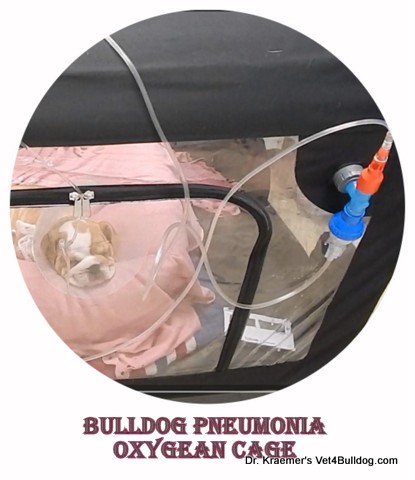
2. BULLDOG PNEUMONIA IV FLUID THERAPY:
In critical cases, where the pet is unable or refuses to drink enough to stay adequately hydrated, IV fluid administration may be necessary both to maintain hydration and to administer medications.
3. BULLDOG PNEUMONIA AND STRESS-FREE RESTING:
Rest is crucial for the swift recovery of your bulldog puppy, preferably in a quiet, confined space away from other animals or active children. Any exertion from stress or activity can exacerbate compromised lung function, disrupting the necessary ventilation-perfusion tissue oxygenation process. This is likely to lead to tissue hypoxia and a ventilation-perfusion mismatch.
4. PNEMONIA NEBULIZER & COUPAGE:
- Hospital Nebulization Benefits: It delivers a fine mist of saline solution or medication directly to the airways. This helps to:
- Loosen mucus and secretions, making them easier to cough up.
- Hydrate the irritated airways.
- Deliver medication directly to the lungs (depending on the prescribed medication).
- Home Steam Room as an Alternative: While a steam room can be helpful in a pinch, it has limitations compared to nebulization:
- Less Controlled: The humidity level and medication delivery are less precise with steam.
- Potential Irritation: Hot, uncontrolled steam could irritate the puppy’s airways further.
- Safety Risk: Leaving a puppy unattended in a bathroom with hot water is a safety hazard.

5. BULLDOG PNEUMONIA / RX:
- Broad-spectrum antibiotics
- Anti-nausea
- Anti-vomit
- Anti-reflux
6. ASPIRATION PNEUMONIA / QUALITY NUTRITION:
Quality food and quality nutritional support are critical
7. ASPIRATION PNEUMONIA / THERAPEUTIC SUPPLEMENTS:
Bully therapeutic supplements can be beneficial preventively and by completing prescribed medication

IMMUNE SUPPORT:

GASTROINTESTINAL SUPPORT:
BULLDOG MULTIVITAMINS:

RELAX and CALM:
- V4B Bully StressLess chews
- V4B HEMP Calm & Relax

Aspiration Pneumonia in Bulldogs / BOAS SURGERY:
If your bulldog puppy is diagnosed with brachycephalic syndrome, including conditions like stenotic nares and/or an elongated soft palate, it’s crucial to have these issues surgically corrected as soon as possible, ideally as early as 8 months old.
Left untreated, these conditions can escalate and lead to various medical complications, including, but not limited to, megaesophagus and aspiration pneumonia. Early intervention can help prevent the progression of these problems and improve your bulldog’s overall health and quality of life.
Dr. Kraemer’s Bulldog Aspiration Pneumonia RULE of Thumb:
Pneumonia in bulldog puppies is a critical condition that could require hospitalization in a critical care unit, entailing weeks of intensive and expensive treatment. Medical teams can monitor tissue oxygenation levels using tools like a pulse oximeter to ensure proper management and recovery.

The majority of my bulldog cases with aspiration pneumonia will recover with proper treatment and with the correction of the underlying cause.
Inhalation Pneumonia in Bulldogs TIPS & WARNINGS:
Bulldog Pneumonia CALM & RELAXED:
While recovering, you should keep your bulldog primarily indoors, rested, and stress-free.
Bulldog Pneumonia NEBULIZER:
Use a nebulizer daily and then perform coupage (percussion therapy), as it helps to dislodge secretions from your bulldog’s lungs.
Bulldog Pneumonia COUPAGE:
Coupage can be performed by holding your hands cupped against your bulldog’s chest, and then putting your hands on your bulldog’s chest so that it sounds like a galloping horse.
You should be firm enough to dislodge the secretions from your sick bulldog lungs but gentle enough not to hurt your French bulldog puppy.
Bulldog Pneumonia PRE-OP PREP:
A few hours of fasting before anesthesia is recommended to avoid vomiting and aspiration.
However, the ideal length of the fast is 8 hours, with water up to 2 hours before.
Dr. Kraemer’s Bulldog Aspiration Pneumonia TIPS WARNINGS:
Bulldog Pneumonia OTC RX WARNING:
Don’t use over-the-counter RX like cough suppressants (the cough is good it helps to remove the “bad stuff” from the lungs)
Bulldog Pneumonia ANTIBIOTICS WARNING:
Don’t stop the antibiotic too soon, usually, a 4 weeks duration is required.

Bulldog Pneumonia R/C EXAM:
Recheck chest radiographs should be taken weekly to evaluate your bulldog puppy’s recovery and healing progress
Bulldog Pneumonia ROTATE:
A bulldog with pneumonia should not be left lying on its side in an inactive state for more than two hours.
Recommended By Owners Approved By Bulldogs



